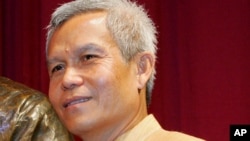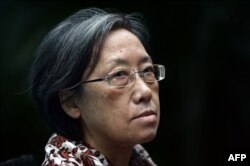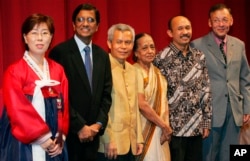Five years ago, Shui-Meng Ng and her husband, Sombath Somphone, were driving their car through Vientiane. It was on that day that he disappeared.
Security camera footage at a checkpoint showed police officers stopping his Jeep. Sombath, a well-known civil society leader, is shown getting out of his vehicle. Moments later, a lone motorcyclist arrives, parks his bike, and drives away in the Jeep. Then an unmarked white pickup pulls up and Sombath gets in the truck, which drives away.
Activists say the police closed-circuit television shows Sombath being arrested at the police checkpoint. Shui-Meng has not heard from her husband since.
“Today, Sombath is still missing,” she told VOA's Lao Service. “I have no choice, I cannot remain silent. I cannot let the … work of Sombath and his dreams and hope for building a better society in Laos” be forgotten.
“Can the world allow Sombath Somphone to disappear? Can we allow this kind of state impunity to continue?” Shui-Meng asked.
At the time of his disappearance, authorities in Laos said they knew nothing about the circumstances. Now they say their investigations are continuing, according to The Diplomat.
In a joint press release issued earlier this week, the International Federation for Human Rights (FIDH) and the Lao Movement for Human Rights (LMHR) expressed their concern about the government’s failure to thoroughly investigate Sombath’s disappearance, which “has generated a climate of fear that is still gripping Lao civil society today.”
VOA’s Lao Service has tried to call Lao Public Security to follow up on the progress of the case but its calls went unanswered.
Background
Sombath, who grew up poor in Ban Don Khio, Khammouane Province, lived with relatives in Thakek, Savannaketh and Vientiane when he was in primary and secondary school, according to the website of the NGO he founded in 1996, Participatory Development Training Center (PADETC).
He spent his senior year of high school on an exchange scholarship, living in Wisconsin with a local family. He studied education and agriculture at the University of Hawaii on a USAID scholarship.
Sombath returned to Laos in 1979, and became well known for promoting simple but innovative methods for improving crop yields and supporting organic farming. He was also vocal about land deals that left thousands of villagers homeless and without compensation, sparking rare political protests, the Associated Press reported in September 2016 when then-deputy White House national security adviser Ben Rhodes told reporters he would meet with Shui-Meng when President Barack Obama visited Laos.
Sombath received the Human Resource Development Award in 2001 from the United Nations Economic and Social Commission for Asia and the Pacific for empowering the rural poor in Laos.
In 2005, Sombath received the Ramon Magsaysay Award for Community Leadership. The Magsaysay Award, often called Asia’s Nobel Prize. The award recognized Sombath’s “contribution to the development of Laos through grass root mobilization and for his conviction that a nation’s future ultimately rests with harnessing the potential and creativity of its young,” according to the PADETC site.
“Although five years have passed, every day I’m still haunted by the images of what happened to him,” Shui-Meng said at a Bangkok conference last week.
This report originated with VOA’s Lao Service.






